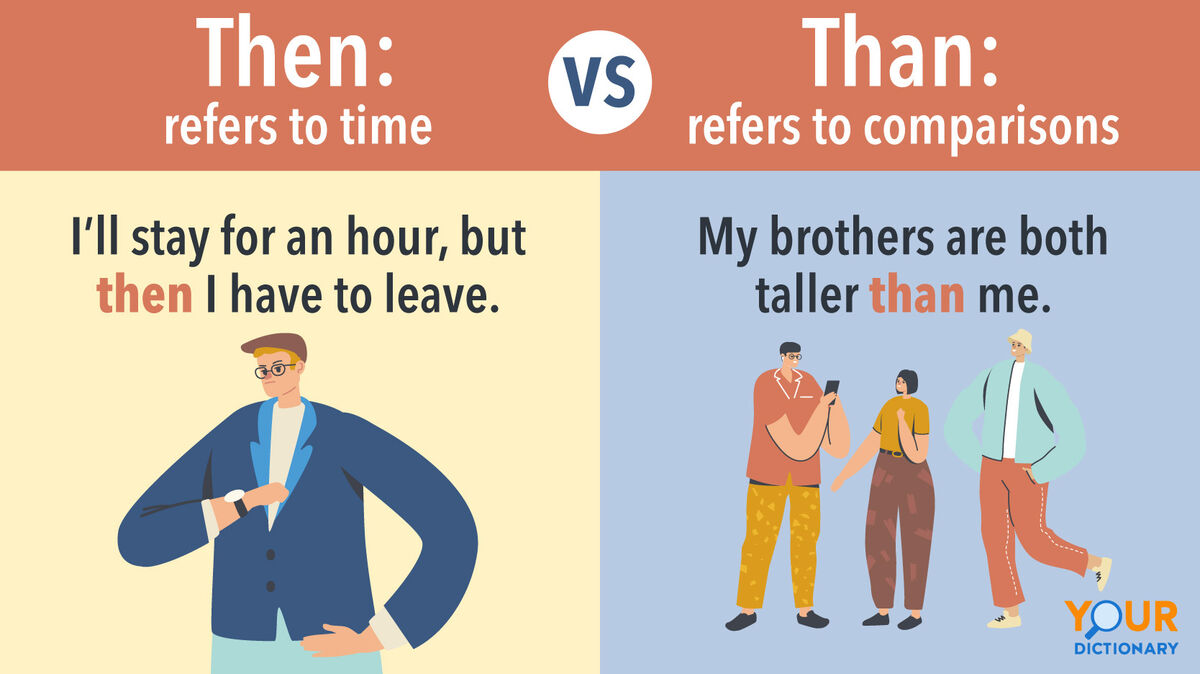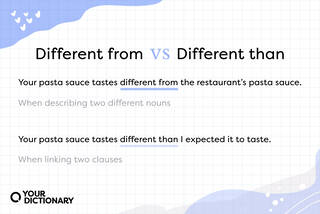
Then and than sound alike, but they're very different words with different meanings.
- Then is used for time.
- I went to the store, then I went home.
- Than is used for comparisons.
- I'd rather buy ice cream than broccoli.
Take a look at some example sentences using each word and some quick tips to remember how to use each correctly.
How To Use "Then" in a Sentence
You'll see then more often than than in writing and conversation. That's because it's more versatile.
Then functions as an adverb, a noun, and an adjective that refers to a point in time.
Examples of "Then" as an Adverb
When you use the word then as an adverb of time, it indicates that one event follows another. For example:
- I graduated from college, then I got a job at the local news station.
- Let's pick a party date and then call everyone to invite them.
- The car turned the corner, then sped off.
Then can also function as a conjunctive adverb (also known as a linking adverb).
It connects two ideas or clauses in sentence, just like a conjunction, but it also modifies the sentence like an adverb. For example:
- If you don't finish on time, then your assignment will be late.
- We can go to the game, but then we really need to study.
- The street may be closed, so then we'll have to take a shortcut.
Examples of "Then" as a Noun
When then functions as a noun, it's typically the object of a preposition. This usage of then signals a point in time. For example:
- Jodi met David way before then.
- Mr. Cross used to be really strict, but he's gotten more relaxed since then.
- I can't afford this car until I get my paycheck, so I'll wait until then.
Examples of "Then" as an Adjective
Less commonly, you may see then used as an adjective.
In these cases, it's part of a compound adjective to describe a condition or position that used to be true but it's not anymore. For example:
- My then girlfriend and I started our business three years ago.
- We wrote to the then president of the company, but he didn't respond.
- Jessica's then best friend told everyone about Jessica's secret.
How To Use "Than" in a Sentence
Writers often use then instead of than when they're comparing things, mostly because then has more functions than than.
Than has only two usages: preposition and conjunction.
Examples of "Than" as a Conjunction
Than can function as a conjunction when it links two clauses or phrases together.
In these cases, you use a subject pronoun after than. For example:
-
Both of my brothers are taller than I am.
-
I like playing basketball more than I like playing soccer.
-
Oliver earns more money than she does.
Often, writers leave the second verb out of the sentence (“Both of my brothers are taller than I”).
This usage is correct, but it can sound incorrect to some people. That’s when you have the option to use than as a preposition.
Examples of "Than" as a Preposition
Than functions as a preposition when it modifies a comparative adjective or another part of the sentence.
Any pronoun that comes after than would then be an object pronoun. For example:
-
Both of my brothers are taller than me.
-
I like playing basketball more than soccer
-
Oliver earns more money than her.
You can also use than as a preposition to compare two ideas or nouns with more, fewer or less. For example:
-
There are more than 300 jellybeans in this jar.
-
Fewer than a dozen people showed up to the game.
-
Did you hear that less than 50% of the public voted in the election?
Helpful Hack
To remember when to use then or than, think of what the word is referring to in the sentence: is it time (then) or comparisons (than)?
- Both then and time have an "e" — you use then to refer to time.
- Both than and compare have an "a" — you use than to refer to comparisons.

Different Than vs. Different From: Is There Really a Difference?